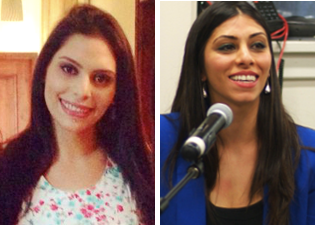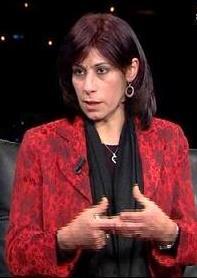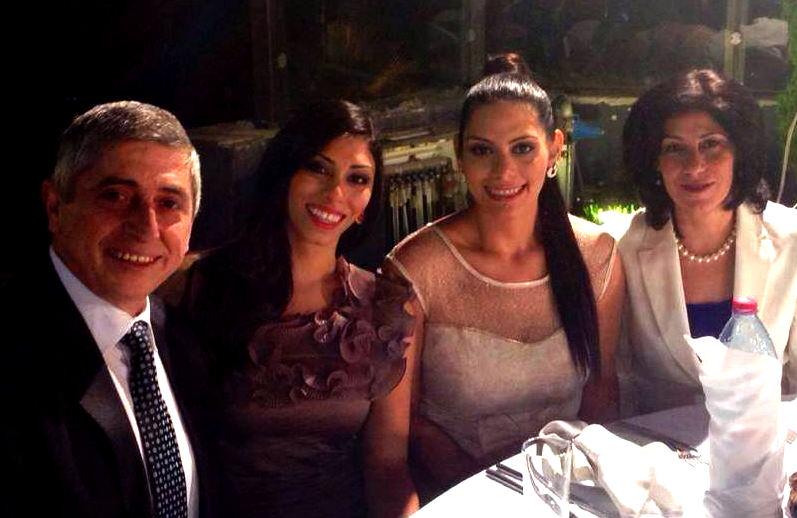Khalida Jarrar is a member of the Palestinian Legislative Council, a leader in the Popular Front for the Liberation of Palestine and an internationally recognized woman human rights defender known for documenting and advocating against human rights violations in occupied Palestine. On August 20th, 2014, Khalida was given an internal expulsion order by Israeli occupation soldiers who invaded her home in Ramallah. Khalida refused to sign the expulsion order, responding:
“You, the occupation, are killing our Palestinian people. You practice mass arrests, demolish homes, kidnap people from their homes and deport them. It is you who must leave our home.”
After challenging the order, Khalida was arrested on 2 April 2015 and remains in prison.1
AWID interviewed Khalida Jarrar’s daughters, Suha and Yafa, about their mother, the politicization of Palestinian women in the occupied territories and the struggles of women human rights defenders for their land and freedom.
AWID: Tell us about your mother Khalida Jarrar and her aspirations for Palestine?

Our mother is a selfless, fearless, tireless fighter who is committed to social justice and anti-oppression not just in theory, but most importantly, in practice. Her politicalization started with the forced displacement of her family from the village of Bissan located in historic Palestine.
In addition to her current position as an elected member of the Palestinian Legislative Council (PLC), our mother has been a leftist feminist activist for over 20 years. She has been particularly active on issues of political incarceration and Palestinian political prisoners. Her most recent direct involvement against Israel’s apartheid system was her role in bringing forward the Palestinian Authority’s (PA) bid to the International Criminal Court over Israel’s war crimes against Palestinians in June 2014.
Our mother has been repeatedly targeted, harassed and repressed by the Israeli occupation forces over the years of her involvement in the fight against Israeli apartheid. Her first arrest was on March 8th, 1989 for taking part in a protest on International Women’s Day. Our father’s continuous arbitrary arrest throughout their life together was an integral reason behind her deep involvement in advocating for political prisoners’ rights.
On a more personal note, our mother raised us to acknowledge our privileges but also be aware of our colonized history and be familiar with the multi dimensional process of decolonization. As my sister, Yafa, once said in an interview, “my mother always speaks the truth to power. She is a woman and a loved leader. That is why they went after her… the occupation is vicious and their attack record shows anyone who speaks out against their aggression is a target”.
AWID: How were you affected by your mother’s struggle to advance the human rights of Palestinians?
Growing up in place where invasions, curfews, bombings, mass shootings, snipers attacks and the arbitrary arrests of our parents and many others made our personal lives political at an early age, made us aware of the importance of decolonizing our minds, pursuing education and fighting for our rights.
We distinctly remember being able to recite the definition of administrative detention, “an indefinitely renewable arbitrary arrest where prisoners are held without trial or charge based on secret information only available to Israel’s military court’s prosecution team and judge”, at age 6. Not only was our father held under administrative detention multiple times by the time we reached that age, we were also exposed, through my mother’s political involvement, to the politics, consequences and terminology of Israel’s apartheid system. Looking back on our past as adults, we now realize how sad, unjust and ‘abnormal’ the conditions we grew up in were.
Our mother taught us that until justice and freedom prevail, our fight against oppression is a continuous one. Our mother’s status as a political and influential leader and activist also helped us realize how important it is to carry on the fight from within, especially as women of color. Carrying out the fight ‘from within’ always meant that the fight has to be carried out for, and led by the oppressed. Her intersectional views on oppression and social injustice taught us that women’s struggles are multi-fold and that the Palestinian struggle is in fact, a feminist one that reflects disparities on issues around race, gender, class and political affiliation, to name a few.
AWID: What are the circumstances in which Palestinian women human rights defenders carry out their activism? How does this affect their families, and the wider communities they live in?
Women’s struggles are multi-fold, especially in a place like Palestine where the efforts and energy needed to carry out this type of work is not only physically exhausting, but also emotionally draining. Women’s advocacy for human rights in a place that faces constant political repression creates an endless struggle where women are continually forced to carry out more than triple the amount of work needed to create other types of change. Working within a system that is supposedly designed to be anti-oppressive, but in reality is constantly (whether intentionally or unintentionally) oppressive in the way it fails to address real struggles and needs, is exceptionally challenging.

Being Palestinian and living in the occupied territories means that you are born into a natural process of politicalization which familiarizes you with human rights violations and advocacy due to the ongoing oppression and silencing by the Israeli authorities. The recognised definition of women human rights defenders may often exclude those who are an integral, but often invisible, part of the process of fighting for human rights. Palestinian women fight for human rights and against injustice everyday without recognition. This means that a teen-girl struggling to cross a checkpoint to attend school is a women human rights defender. A woman giving birth at a checkpoint is also considered a defender. Women kidnapped and taken away from her family and loved ones, women sexually, emotionally and physically tortured and abused behind Israel’s prison bars are also women human rights defenders . Being women human rights defenders in Palestine is not a choice; it is a label that we, Palestinian women, earn from the day we’re born under occupation and apartheid.
As for my mother, her long-time advocacy for human rights always came with expected but detrimental cost. Knowing that Israel is a state that criminalizes human rights advocacy, we always knew that arrests, harassments and other acts of injustice were a possibility. As children, we were always aware that the invasion of our home was possible and expected at any moment.
AWID: What is the role of gender in the criminalization of human rights advocacy in Palestine?
Israel’s use of women’s bodies as a tool to shame, criminalize and punish women defenders has been a long-time colonial practice. Testimonies from unlawfully incarcerated Palestinian women have constantly shown the extent to which Israel uses women’s bodies and sexuality against them. Calling women under “investigation” names like ‘whores’, ‘sluts’, ‘unworthy’… etc has been repeatedly documented by women who’ve experienced torture in Israeli prisons. The actual act of raping and sexually assaulting women who are captured and/or imprisoned has also been repeatedly documented.
Women’s socially expected commitment towards their families also has been used against them in an attempt to force them to confess to ‘crimes’. Women arrested at demonstrations, checkpoints and other venues are often harassed by being reminded of how they ‘failed to take care of their dependents’, how they ‘failed their families’, and how no one cares about them because by being activists they ‘failed’ to meet the social obligations expected of them.
Quite maliciously, hundreds of women detained in Israeli prisons often recall being denied access to sanitary products during their monthly period as well as access to showers and other personal hygiene facilities. Prison guards would also call them out and shame them on being ‘stinky’ and ‘dirty’ during that period. Shaming women for their ‘unfeminine’ and ‘not-lady-like’ acts of resistance is also a commonly used tactic to intimidate and shame Palestinian women human rights defenders.
AWID: Do you think the women human rights defenders framework – which is put forward by international human rights mechanisms - is useful and relevant for the Palestinian context? If not, how should the framework be revised?
We must recognize the opportunities that the women human rights defenders framework offers in the Palestinian context. The framework could potentially, and sometimes does, provide windows of opportunity for the voices of the most-impacted women to be recognized.
Having said that, development work centered around “women’s empowerment and advocacy” is partly problematic as it fails to: include and emphasize the voices of women struggling to fight injustice; correspond to women’s everyday struggles and needs; capture the intersectional reality of women’s resistance; operate in a non-hierarchical, anti-colonial, anti-oppressive way that captures the reality of women’s intersectional struggle and what is needed to solve it.
We need to continue using the tools available through this framework to guarantee that the solutions provided reflect and correspond to the voices and needs of the first and most impacted peoples in a practical rather than a merely theoretical way. For instance, many women’s advocacy projects in Palestine are restricted to social awareness and education. While advocacy and empowerment is incredibly important, it serves little to no purpose when it operates in isolation of addressing women’s practical needs and experiences.
AWID: What hopes and aspirations do you have for women human rights defenders for the future? What would you like to say to women human rights defenders about the work they are doing?
First and foremost, we would tell them to keep up the work! Everything we as human rights advocates are doing, as long as it’s not destructive, is critically important. The fight may seem endless and we may feel helpless to creating real change. It takes time for social and political change to take effect. This is why we should never give up. We’re building on the work of radical and influential women. Future generations will be building on our work as well. Our work is incredibly valuable as long as we maintain a progressive and anti-oppressive foundation.
Our aspirations for women human rights defenders, particularly when it comes to Palestine, is for our struggle to continue to be progressive, inclusive and most importantly, intersectional. I hope that we do not fall into the trap of using conventional, liberal development rhetoric that serves the economic and political interests of certain groups. This fight is by the people and for the people, and it should continue being that way until justice and freedom prevail.

